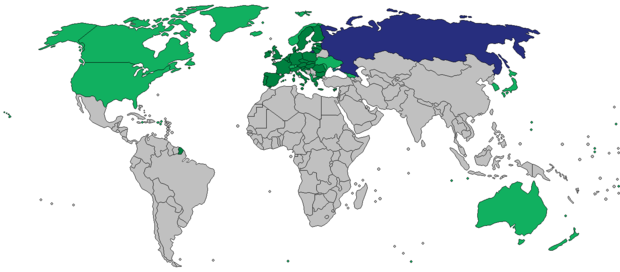''Suboptimal equilibrium'': how Russia and EU deal with reciprocal sanctions
In 2014, the European Union imposed sanctions on Russia because of the Ukrainian conflict. Moscow responded with countermeasures. Almost three years later, the sanctions are still there and neither side wants to give in. Frank Beauchamp, a European political analyst, gives a review of the situation for the EUobserver considering the impact on the two economies.
The EU sanctions limit access to finance, ban exports of advanced technology to Russia's energy sector and impose travel bans on senior Russian officials. Russia, in its turn, imposed an embargo on imports of most of the agricultural products. This decision has hurt particularly nearby EU countries such as Finland and the Baltic states. Trade between the two economies, which had previously showed a steady growth, collapsed. ''The result has been a suboptimal equilibrium, both sides being somewhat hurt, but neither willing to back down, especially as both economies have since seen improvement'', considers Beauchamp.
In the European Union, Russia's food ban has affected many countries, especially neighbouring ones. However, the European Commission's economists state that Russia's sanctions have not had a significant impact on the EU economy overall, despite problems in certain sectors. The Union's GDP has grown by over 1,5% in 2015 and 2016. Unemployment level is the lowest in five years, though the situation is still bad, even in major states like France and Italy.

As for Russia, the food import ban has been favourable to Russian farmers because it reduces competition level. In addition, a falling ruble has helped to raise Russia's export competitiveness. In 2015, for the first time, Russia produced more grain than the United States. Besides, Russian agricultural exports surpassed arms sales. However, in the domestic market, food inflation reached more than 25% last year. The country's economy has seriously suffered since the beginning of the sanctions (probably, it has been caused by oil price drop).
Now the recession in Russia is almost over, although economic growth has not started yet. Unemployment and public debt levels are low. The country is trading with Asian states, which have a considerable growth potential. Russia is also developing the Eurasian Economic Union consisting of 5 member states, former Soviet republics.
Russia's political scene looks stable as well: ratings of Vladimir Putin have reached 80%. Meanwhile, across the West the situation is far more uncertain after Great Britain's decision to leave the bloc. Taking into account Donald Trump's election as president of the United States, Beauchamp supposes that the European consensus against Putin's foreign policy can be broken if the president-elect emerges as a rare pro-Russia American president.